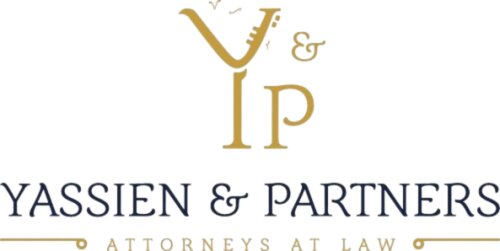Best Mining Law Lawyers in Agouza
Share your needs with us, get contacted by law firms.
Free. Takes 2 min.
List of the best lawyers in Agouza, Egypt
About Mining Law Law in Agouza, Egypt:
This section provides a short, practical overview of how mining is regulated when your project or question relates to Agouza - a district inside Greater Cairo. Mining activity in Egypt is governed mainly by national mining law and the rules issued by the competent national authorities. Mineral resources are owned by the state, and mining rights are granted through a formal licensing system that covers prospecting, exploration and exploitation. Because Agouza is an urban district of Giza, active large-scale mining is rare there. Most mining and mineral extraction in Egypt takes place in the Eastern Desert, Sinai, and the Western Desert. In an urban setting like Agouza legal issues are more likely to involve small-scale extraction for construction materials, regulatory compliance for subsurface works, zoning and land-use conflicts, environmental and archaeological protections, and permits from local authorities in addition to national approvals.
Why You May Need a Lawyer:
Mining law issues commonly involve complex overlaps between national regulations, environmental law, property rights and local municipal rules. You may need a lawyer when you are planning to apply for a prospecting or mining license, negotiating surface access or compensation with a landowner, preparing or responding to an environmental impact assessment, or defending against enforcement or criminal charges for unauthorized extraction. Lawyers also help with due diligence for transactions, licensing transfers, joint-venture agreements, regulatory compliance programs, and dispute resolution - whether in administrative proceedings, civil courts or arbitration. In urban districts like Agouza, a lawyer can also help navigate municipal zoning, building permits and interactions with local governorate offices.
Local Laws Overview:
Main national framework - Mining in Egypt is regulated primarily by the national mining law and its implementing regulations. These set out the licensing system - prospecting, exploration and exploitation - the application process, terms and duration of licenses, and obligations such as reporting and rehabilitation.
Regulatory authorities - The competent national authorities supervise licensing, monitoring and enforcement. These authorities handle permits, technical approvals and registration of license holders. Environmental approvals are handled by the national environmental agency and through the environmental impact assessment process.
State ownership of minerals - Under Egyptian law mineral resources are public assets. Surface land ownership does not automatically include rights to minerals beneath the surface. Separate mining rights must be obtained from the state.
Environmental and heritage protections - Environmental law requires assessments, pollution controls and rehabilitation plans for most mining activities. Where work affects archaeological or heritage sites, additional clearances from the competent antiquities or heritage authorities are required.
Local and municipal rules - Activities within Agouza are also subject to municipal zoning rules and building regulations. Small-scale extraction for construction materials or subsurface interventions will need approvals from Giza governorate and local municipal offices, which may impose stricter conditions than the national mining framework.
Health and safety and labor law - Mining or excavation work must comply with workplace safety, labor and social insurance laws enforced by the relevant ministries. License holders are typically required to ensure worker safety, training and statutory benefits.
Taxes, royalties and fees - Licensed mining operations are subject to royalties, corporate taxes and specific fees set by law and by the terms of the license. Financial guarantees, bonds or insurance to cover rehabilitation and closure are often required.
Dispute resolution - Disputes can arise over licensing decisions, compensation, contract performance and enforcement actions. Remedies may include administrative appeals, civil litigation in Egyptian courts or arbitration if provided by contract.
Frequently Asked Questions:
What law governs mining activity that may affect Agouza?
Mining activity is governed by the national mining law and its implementing regulations, together with environmental protection law, labor and safety regulations, and municipal zoning and building rules that apply in Agouza. National authorities handle mineral licensing and oversight, while local government handles municipal permits and land-use matters.
Can I obtain a mining or extraction license for a site in Agouza?
Large-scale mining in urban districts like Agouza is uncommon and often restricted by zoning, health and safety, and environmental rules. Small-scale permits for construction materials or subsurface works may be possible but require coordination with national mining authorities and local municipal and governorate offices. A lawyer or licensed consultant can assess feasibility.
Who owns the minerals under the land in Egypt?
Mineral resources are owned by the state. Surface land ownership does not automatically include subsurface mineral rights. To exploit minerals you normally need a permit or license from the competent national mining authority, even if you own the surface land.
What types of mining permits or licenses exist?
Common authorizations include prospecting or reconnaissance permits, exploration licenses, and exploitation or mining licenses. There may also be short-term or small-scale permits for specific materials. Each type carries different requirements, durations and obligations, and some require environmental approvals and financial guarantees.
Do I need an environmental impact assessment?
Most exploration and exploitation projects require environmental review. Larger or higher-impact projects will require a full environmental impact assessment and approval from the national environmental agency. Even smaller projects may need environmental permits or mitigation measures imposed by the municipality or governorate.
How long does it take to get a mining license?
Timing varies with the permit type and the complexity of the application. Administrative review, technical evaluations and environmental approvals can extend the process from several months to longer. Delays commonly occur when applications lack required documentation or when archaeological, environmental or land-use issues arise.
Can a private landowner mine minerals found on their property?
No - because minerals are state-owned, the landowner must obtain the appropriate mining authorization from the national authority to legally extract minerals. The landowner and licensee also need to address surface rights and compensation for any damage to the surface or structures.
What taxes, fees or royalties will apply?
Licensed operations typically pay royalties on extracted minerals, corporate tax on profits and various fees required by law or by the license terms. Specific rates and formulas depend on the type of mineral and details in the licensing regime. Financial guarantees for rehabilitation and closure are commonly required as well.
How are disputes over mining rights handled?
Disputes can be raised through administrative appeal mechanisms before national authorities, through civil courts for contract or compensation issues, or by arbitration if the parties agreed to it. The appropriate forum depends on the nature of the dispute - administrative decisions, contractual disagreements or criminal enforcement matters each follow different processes.
What are the consequences of illegal mining?
Unauthorized extraction can lead to administrative sanctions, fines, seizure of equipment, orders to stop operations, civil liability for damages, and criminal prosecution in serious cases. Authorities also commonly require remediation and may impose financial penalties and bans on future licensing.
Additional Resources:
Egyptian Mineral Resources Authority - the national body involved in mineral licensing, technical oversight and registration of mining activities. Contacting the competent authority helps clarify licensing requirements and technical standards.
National environmental agency - responsible for environmental review and approvals, including environmental impact assessments and monitoring requirements that apply to exploration and mining projects.
Giza Governorate and Agouza municipal offices - local authorities handle zoning, building permits and local approvals for works within the district. They enforce municipal regulations and may impose additional conditions or restrictions.
Ministry of Petroleum and Mineral Resources - the ministry that oversees mineral and petroleum sectors and coordinates high-level policy and regulation affecting mining.
Ministry of Manpower and related labor agencies - for workplace health and safety and labor compliance applicable to on-site workers.
Licensed environmental and technical consultants - firms that prepare EIAs, technical studies and rehabilitation plans. They are often required as part of the licensing package.
Experienced Egyptian lawyers - look for counsel specializing in mining and natural resources, administrative law, environmental law and land use. A local lawyer will understand how national rules interact with Giza governorate and Agouza municipal practice.
Next Steps:
1. Clarify your objective - Determine whether your interest is prospecting, full mining, small extraction for construction materials, or a subsurface intervention related to construction or utilities.
2. Check the location - Verify zoning, land title, archaeological constraints and whether the area is designated for any special protection by municipal or national authorities.
3. Consult a specialist - Arrange a consultation with a lawyer experienced in mining and administrative law, and consider an environmental or technical consultant to assess feasibility and likely permitting requirements.
4. Gather documentation - Prepare land documents, technical plans, environmental baseline studies and any existing permits that may be relevant to a licensing application.
5. Contact authorities - Through your lawyer or consultant, engage with the national mining authority and the local municipal and governorate offices to confirm application procedures, fees and timelines.
6. Prepare required studies - Commission any required environmental impact assessment, technical feasibility study and closure plan, and obtain required financial guarantees or bonds.
7. Submit your application - Follow the formal application steps under the applicable mining regulations and local permit processes, and be prepared to respond to requests for additional information.
8. Maintain compliance - Once authorized, implement monitoring, reporting and rehabilitation commitments, ensure worker health and safety compliance, and stay current with tax and royalty obligations.
9. Plan for disputes - Retain counsel for potential administrative or contractual disputes and include clear dispute-resolution clauses in private agreements.
10. Seek qualified representation - Always use a licensed Egyptian lawyer for final legal advice and representation. This guide is informational and not a substitute for professional legal counsel tailored to your specific circumstances.
Lawzana helps you find the best lawyers and law firms in Agouza through a curated and pre-screened list of qualified legal professionals. Our platform offers rankings and detailed profiles of attorneys and law firms, allowing you to compare based on practice areas, including Mining Law, experience, and client feedback.
Each profile includes a description of the firm's areas of practice, client reviews, team members and partners, year of establishment, spoken languages, office locations, contact information, social media presence, and any published articles or resources. Most firms on our platform speak English and are experienced in both local and international legal matters.
Get a quote from top-rated law firms in Agouza, Egypt — quickly, securely, and without unnecessary hassle.
Disclaimer:
The information provided on this page is for general informational purposes only and does not constitute legal advice. While we strive to ensure the accuracy and relevance of the content, legal information may change over time, and interpretations of the law can vary. You should always consult with a qualified legal professional for advice specific to your situation.
We disclaim all liability for actions taken or not taken based on the content of this page. If you believe any information is incorrect or outdated, please contact us, and we will review and update it where appropriate.









